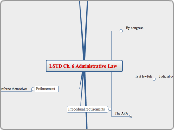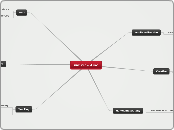LSTD Ch. 6 Administrative Law
Limitations of the Agency Powers
Regulated by the three branches
Public accountability
Small business Regulatory Enforcement Fairness Act
Allows small business recover their expenses and legal fees when they are considered excessive
Receive comments
enforces the regulatory flexibility act
60 days after making rule
Regulatory Flexibility Act
If it harms to much, be flexible and seek another law
Government in the Sunshine act
disclose info about meetings and agencies
limit
Crime, frustration of plans, future litigations or rulemaking
Freedom of information Act
Agencies have to disclose info
Office Of information and Regulatory Affairs (OIRA)
Cost-effectiveness of agency rules
Review without following APA
Veto power
Veto enabling legislation or modify it
Appoint federal officers
Legislative
Freeze laws
Small business regulatory enforcement fairness act
they have 60 days after making a rule
Investigation of agencies
Limits to agencies (monetary, time)
Erase agencies
Take away power from agencies
Judicial
Power to review Agencies decision
Limitations
Ripeness doctrine
Requirements
Controversy
Standing to sue
Exhaustion doctrine
Exhaust all the administrative remedies or processes
Unless remedies are inadequate
Enforcement
Agencies enforce themselves
Adjudication
Process of resolving dispute before a third neutral party
Agency orders
Initial order
Not applied
Can be applied
Agency commission
Apply
Federal court of appeals
Final Order
Hearings
Frequently informal
Formal adjudicatory hearing
Similar to trial
Differences
The burden of proof is place on the agency
More evidences accepted
APA
Requires
Agency issue a notice
Place
Time
legal authority for the hearing
Facts and law of the complaint
Trial-like arbitration procedure
Administrative law judge (ALJ)
APA makes sure of that
Separated
Works for the agency but has to be unbiased
Answer by the company
Agency issues a formal complaint
Negotiated Settlements
Solve the problem without additional proceedings
Agencies
Conserve their own resources
Business
Cheaper
Cooperative
Investigation
After Final rule, who is not following it?
Subpoenas
Limits
Burden of the demand on the party from whom the info is being sought
Company pays
Specifity of the demand for testimony or documents
Describe the material
Relevance of the information being sought
Use relevant info
Purpose of the investigation
Legitimate purpose
Subpoena duces tecum
Bring it with u (books, records)
Subpoena ad testificandum
Writ to make a witness appear at a hearing
Inspections
Alcohol or firearms
No need for warrant
4th amendment
Protects against unreasonable seaches, need a warrant
"friendly" way of getting the information
Judicial Deference to Agency Decisions
Judges Defend Agency decisions
But can the administrative agency interpretate its authority?
But in order to be assured, Agencies should follow the rulemaking procedure
Chevron case
Yes
Court should accept aAgency Reasonable? Court accept it
Congress is silent or ambiguous
Precedural requirements
The APA
(No APA control) Informal Agency Actions
Interpretive Rules
Advice over enabling statute's meaning
dont follow
Rulemaking!
Rulemaking procedures
Notice-and-comment rulemaking
Final rule
States
Purpose
Basis
Published in the Federal Register
Code of Federal Regulations
Binding
Legislative rules
Affect Rights
Comment period
Interested parties express opinions
Change or mantain rule and answer why
Notice of the proposed rulemaking
Publish notice in Federal Register
Scientific data backing up the proposal
Terms and subject matter
Authority
Where and When proceeding
Is it lawful?
Judicial control over administrative agencies
Decision contrary to the evidence
Failed to consider relevant factors
Legally inappropriate factors
Changed prior policy without explanation
No rational explanation
2. Laws arent lawful when
Not accordance with law
abuse of discretion
Capricious
Arbitrary
1. Unlawful
Created by
Administrative Agencies
Types
Independent
"Fourth Branch"
Bureaucracy
President
Appoint members
Employees
Cannot be removed without just cause
Serve for fixed terms
Examples: FTC, SEC
Apart from the government
Executive
Authority: The president
Branch of the government
Its created by
Congress
Enabling Statute
Defines its legal authority
Enabling Legislation
Name, Purposes, Functions and Powers
Specific regulations
Society is better off
Burden on the businesses
Small business
No Economies of scale
Experts









